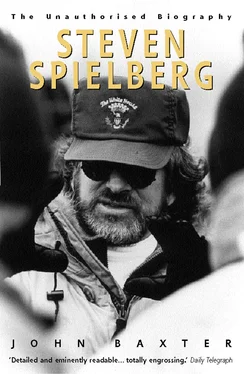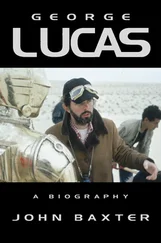The script also addressed some of the fears that were to motivate Spielberg for the rest of his career. A few years later, British critic Gavin Millar pressed him to identify the anxieties that drove Duel . Was it the technology of the truck that frightened him?
‘No, not the truck,’ Spielberg mused. ‘Loss of control maybe.’
Since childhood, security for Spielberg had reposed in control, and in adulthood it remained a paramount concern. Control of his environment, his emotions, his work. Twenty-five years later, Oskar Schindler would expound to the Nazi camp commander Amon Goeth, ‘Control is power.’ Spielberg remembered puttering along the freeways in his uncle’s Chrysler as trucks roared past, air horns blaring at this slow-coach. It wasn’t the car he identified with in Duel ; it was the truck ; its omnipotence, its power.
The Vice President in charge of features programming at ABC TV in 1970 was Barry Diller, an ambitious executive in his early thirties, later to run 20th Century-Fox. Sensing the audience’s greed for movies, he’d launched the ABC Movie of the Week, a Monday-night showcase for new features, and was hungry for product. Universal saw Duel as an ideal Movie of the Week. But Spielberg, itching to escape the TV ghetto, argued that it should be a full cinema feature. And if Sheinberg would OK it, that would bypass Ned Tanen.
‘If you can find a star who’ll do it,’ Sid Sheinberg conceded cannily, ‘we’ll see.’
Spielberg sent the script to one of the few Universal regulars who could project the necessary combination of vulnerability and resolve in Dave Mann, but Gregory Peck, as Sheinberg anticipated, wasn’t interested. The project reverted to Diller, who quickly approved both it and Spielberg.
‘I saw an episode of The Psychiatrist which he’d done,’ Diller recalls. ‘I thought, “What good work.”’
Staff producer George Eckstein was assigned to bring in the production at about $300,000. To star, a disappointed Spielberg was allocated Dennis Weaver. OK, so he’d been the stuttering motel ‘night man’ in Orson Welles’s Touch of Evil , though most people remembered him as Chester B. Goode in the TV series Gunsmoke , limping after James Arness and calling, ‘Mistuh… er… mistuh Dillon?’ He’d found fame of sorts at Universal as a cowboy cop transplanted to the big city in McCloud , but a character actor was always a character actor.
From the moment he read the script, Weaver begged for more meat, with a scene or two where he confronts and defies the truck before the climax. ‘I just don’t want to be this guy the way he’s written,’ he complained.
But Spielberg, sensing Weaver’s core of weakness, on which so many other directors had traded, insisted he play Mann as a pussy-whipped wage-slave who greets every problem with sweaty-palmed indecision.
Mann fails to rescue a broken-down school bus menaced by the truck. When his car impotently spins its wheels as he tries to start it, the children inside, his surrogate family, jeer. Mann cuts and runs, after which, in the ultimate indignity, the truck not only spares the bus but arrogantly helps it on its way. He’s out-thought at every turn by the truck, which ambushes him at one point near a railway line, and tries to push his car into a freight train.
Too embarrassed to demand help in the lonely gas stations and greasy spoons, Mann finally waves down an old couple, who simply drive off. It’s only when his self-esteem is completely eroded that he finds the grit to oppose and defeat his opponent. To drive home the point, Spielberg recorded Mann’s self-pitying meditations on his life and nursed Weaver through his performance from the back seat, playing the recording of his internal monologue at the point where they would appear in the finished film. Cropped out for TV, but revealed when the film was shown on the big screen, Spielberg can be seen scrunched at the edge of the frame in a car interior.
Talk, often only half-heard, is the obbligato of Duel . For the first seven minutes – a sequence added for cinema release – the only soundtrack is a radio programme, incorporating a conversation between a census helpline and a comedian who sounds like Shelley Berman (but who is actually credited under the improbable name ‘Dick Whittington’). The census form is insufficiently exact, Whittington whines. ‘Head of the house’, for instance. Well, in theory, that’s him, but it’s his wife who really wears the pants. He moans on to the embarrassed, hapless operator.
Mann laughs, but he has the same problem, as we find during a chilly phone conversation with his wife, whom he failed to defend the previous night from the passes of a friend who ‘practically tried to rape me in front of other people’.
‘What did you want me to do?’ Mann grumpily asks. ‘Fight him?’
This scene, written by Eckstein, and two or three others, including the opening drive out of Los Angeles, the attempt to push the car into the train, and Mann’s encounter with the school bus, were done later to bring the film up to theatrical length at the request of Universal’s European sales organisation, CIC. The additions caused many headaches, especially finding another truck sufficiently similar to the one that had gone over the cliff.
For his part, Spielberg repudiates almost all of the additions, despite the fact that, without exception, they amplify those themes in Duel which were to become typical of his work: paternal emasculation, the decline of the father’s role in the family, and the importance of a man’s reclaiming his woman and self-respect in combat with rivals. Also, years later, he would insert a similar scene to the encounter with the school bus into Always. A driver in that film has a heart attack but Brad Johnson resuscitates him, watched by admiring kids, an impressed Holly Hunter, and a ghostly, defeated Richard Dreyfuss. Looking good in front of the kids matters to Spielberg more than anything.
Duel is all about fathers failing, women taking control, men losing it. It’s frankly Oedipal. With it, Spielberg struck out at Arnold’s abandonment of his family and its resultant fragmentation. Though Spielberg always spoke warmly of his sisters – ‘I come from a family of beautiful women,’ he says, comparing Sue, the middle sister, to Sophia Loren – he was ambivalent about Sue’s 1975 decision and that of the youngest, Nancy, to leave the US and work on a kibbutz in Israel. Leah’s recent remarriage, to another computer engineer, Bernie Adler, also distressed him. Superficially his attitude to his stepfather was cordial, though he was not above jokes about his mother’s ‘taste for printed circuitry’.
A truer sense of his betrayal by both parents emerged in a tirade a few years later, where he excoriated David Mann as ‘typical of that lower-middle-class American who’s insulated by suburban modernisation’:
It begins on Sunday; you take your car to be washed. You have to drive it but it’s only a block away. And, as the car’s being washed, you go next door with the kids and buy them ice cream at the Dairy Queen and then you have lunch at the plastic McDonald’s with seven zillion hamburgers sold. And then you go off to the games room and you play the quarter games: Tank and the Pong and Flim-Flam. And by that time you go back and your car’s all dry and ready to go and you get into the car and drive to the Magic Mountain plastic amusement park and you spend the day there eating junk food.
Afterwards you drive home, stopping at all the red lights, and the wife is waiting with dinner on. And you have instant potatoes and eggs without cholesterol – because they’re artificial – and you sit down and turn on the television set, which has become the reality as opposed to the fantasy this man has lived with that entire day. And you watch the prime time, which is pabulum and nothing more than watching a night light. And you see the news at the end of that, which you don’t want to listen to because it doesn’t conform to the reality you’ve just been through prime time with. And at the end of all that you go to sleep and you dream about making enough money to support weekend America. This is the kind of man portrayed in Duel .
Читать дальше












